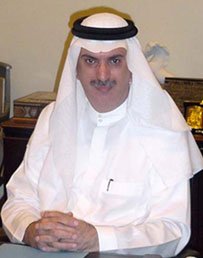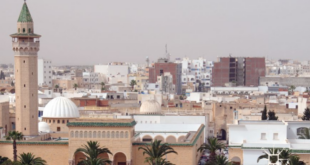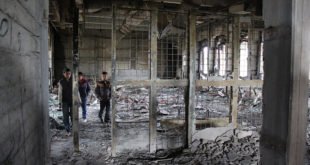Samir Abdulhadi took over as Orbit's CEO in Rome on the first day of 2002. In September 2002, TBS asked him about himself, about Orbit's plans to move some of its staff to Bahrain, and the channel's plans for the future.
| Also in this issue:
Orbit Announces New Channels and Services |
TBS: Will this change in leadership be reflected in a change in the character or substance of Orbit? Under your predecessor, Orbit was moving toward increasing Arabization of its platform. Is this trend continuing? Or is it the opposite-since the fall you've added several new English-language channels. Are you back to seeking to attract an audience interested mainly in Western news and entertainment?
Abdulhadi: My presence at Orbit is merely a reflection of continual change taking place within the organization after the very successful start-up phase of the company.
My appointment serves to demonstrate clearly the intention to increase Arabic content on the platform. However, I must emphasize that Orbit's direction is not decided by me alone and that the decision-making process in the company is institutionalized and well defined. The Board of Directors plays the key role in establishing core ideology, future plans and in defining strategy. As CEO, and with the assistance of the management team, my responsibility is to implement and realize the vision.
It is my belief that internal change at any level should be as invisible to customers as possible but that any results should be very real in terms of service. With this in mind, we have been and are still very much moving towards Arabization and we are seeking to place it at the very core of Orbit's identity.
I would urge you not to read too much into the inclusion or introduction of any English language channels. It is relatively easy to add a pre-packaged, pass-thru channel to the platform. All that is needed in this scenario is careful negotiation with the vendor and agreement on a pricing strategy. Conversely, the design and evolution of a range of exclusive, platform-generated Arabic channels is in a different order of magnitude and the timescales are consequently longer.
We have intentionally developed the Arabic content across the platform with the customer in mind. Changes have been warmly received and we shall continue to add to and to develop our Arabic programming as much as possible. I must point out though, that this does not preclude changes in our Western Programming content and it would be misleading to believe that Orbit's strategy is polarized.
We have a strong brand, a good presence in the market and an attractive bouquet. Our strategy as far as our audience is concerned is simple. We aim to provide the best entertainment available to all our viewers whether they be Arab nationals or expatriates. We have a wide and diverse client base and we aim to offer an unrivalled service and a broad range of programming to the multitude of tastes that exist in our territory.
In our efforts to offer the best service possible, we must acknowledge that the tastes and preferences of our customers shift. The customer is key and acts as our barometer in deciding the way forward and we must adapt quickly to new styles and reflect them in what we do. We do not therefore seek to attract audiences; rather, they define both our direction and our success. Thus we are constantly looking to build on the core strengths of the company through new initiatives and progressive change and if I am to leave any imprint in the character or substance of Orbit, I would wish it to be an increased customer focus and an unmatched approach to subscriber satisfaction.
TBS: What's your professional background, and how did you come to Orbit? When exactly did you take over as CEO?
Abdulhadi: Having studied in the UK, I returned to my native Saudi Arabia where I worked at Saudi Basic Industries Corporation (SABIC) for 10 years.
I held various senior positions, which collectively gave me an enormous amount of exposure to a wide variety of fields. In 1991, I joined the Mawarid Group and embarked upon a career that culminated in my appointment as Managing Director of Mawarid's Distribution and Trading Group.
I held this post until relatively recently. Then I became Obit's new CEO, somewhat appropriately on New Year's Day 2002.
TBS: Reliable sources in the industry say that Orbit will start moving its operation from Rome to Bahrain in March 2003. Will you confirm this report and tell us the reasons that have prompted this move and how it will effect your staffing and recruitment since presumably some of the people now working for you in Rome will not want to make the move to Bahrain. And why Bahrain instead of Dubai, which is investing heavily to provide favorable infrastructure and environment as a media production and broadcasting center?
Abdulhadi: Early next year will indeed see the move of some of our senior staff from various cities to Bahrain. However, to clarify, this constitutes a corporate move, which does not affect the broadcast and transmission from Rome.
It makes a great deal of commercial sense for us to relocate some key corporate functions to the region in this way. Benefits for the platform include boosting business through proximity to the market, and cost savings.
In fact, the vast majority of our staff will not be affected by this move and of those key people; we do not expect to lose anyone to this change. Bahrain represents an attractive proposition for us and offers everything we were looking for in a location for our business. Like Dubai, Bahrain's infrastructure is also highly developed and we will be able to establish a hub for our operations easily.
TBS: You're currently broadcasting across the Middle East and North Africa, plus a select bouquet in Europe. Do you plan to expand service into other regions, such as Asia or North America? If so, what are the plans, and when do expect this to get underway?
Abdulhadi: First and foremost, Orbit is a Middle Eastern broadcaster and we regard the region as our homeland.
Secondly, Orbit is a commercial business and not a public service enterprise. We have no plans therefore to expand into regions where there is no profitable business model. Rather, we shall continue to consolidate further our market presence in the Middle East prior to making concrete plans to expand into other parts of the globe.
Costs of delivering the service to certain parts of Asia and the African continent are almost certainly prohibitive. However, it would certainly make sense to launch an Arabic bouquet in North and South America (economies of scale can be gained by use of an integrated satellite platform) and we are constantly in touch with major players to identify the correct commercial particularities and potential. As you will understand, the financial meltdown in Latin America and the uncertainty surrounding the Direct TV corporate merger in the United States means that the launch of our services in America will undoubtedly be a lengthier process than we would ideally appreciate. Service providers cannot afford to stagnate and must constantly look ahead to fresh ideas and to new ways of conducting business. The need to reassess our technology requirements provides us with the perfect foundation upon which to evaluate the opportunities for expansion and it makes good sense for us to approach the future with new territories in mind.
TBS: Orbit was the pioneer in Arabic-language news, with the joint venture with the BBC to provide the BBC Arabic Service in the early to mid-1990s. Isn't it time Orbit got back into news?
Abdulhadi: Orbit has never got out of news and has always attached great importance to it. Our Arabic programming is full of current affairs content and discussion of global issues. I would like to draw your attention to the interview sessions conducted by Emad Eddin Adib, which have become a benchmark for televised debate and discussion on events in the region.
In terms of a dedicated, stand-alone news channel however, I would like to dwell a moment on the international examples that turn a profit. Traditionally, they are either government sponsored (e.g. BBC, RAI in Italy and France 2) or free-to-air and capable of self-financing through significant advertising revenue or through numerous cable affiliates which result in a massive number of subscribers paying a monthly per-sub amount. Unless one of these conditions can be met it is very costly to provide 24-hour News coverage from around the world.
For the moment therefore, Orbit is content to provide its existing bouquet of News Channels on the encrypted platform and a wide variety of digital free-to-air channels from Arabsat at no cost to our subscribers. I would like to stress that Orbit News is a unique mainstay of the platform. It represents a high quality news medium offering an unparalleled range of coverage from the major networks.
TBS: One of your most popular shows in the region, from its beginning, has been Ala'l Hawa (On The Air)-the first in the region to do live, call-in talk shows. Describe for us the impact of this show, and your special episodes covering the Beirut summit and current events in Palestine.
Abdulhadi: Ala'l Hawa is a fine example of a new initiative that has been developed in-house and that has become a successful reality, from drawing board to production line. The programme has had a substantial impact on viewers and has helped to reshape the nature of programming in the region in general.
Hosted by Emad Eddin Adib, Ala'l Hawa has from day one succeeded in being a high-level talk show covering a range of topics and issues relating to politics and economics as well as a variety of cultural and social issues. Kosovo, Palestine, and Afghanistan have all featured on the programme in recent months. Interviews have been held with a number of top politicians and several Arabic heads of state: the late King Hussein (Jordan), Kaddafi (Libya), Hosni Moubarak (Egypt), Bouteflika (Algeria). Discussion forums were also organised with high-profile figures such as the Secretary General of the Arab League Amr Moussa, Ismat Abdelmajid, Walid Joumblat, Hanan Ashrawi, Faissal al Husseini and others.
We make all efforts to follow major regional and international events closely, accurately, and impartially and we try at all times to provide balanced and objective comment.
During the last Arab Summit in Beirut, the program covered all sessions 'Live'. A talk show with Elias Haraoui, the former Lebanese President, was held and two exclusive interviews were aired, one with HRH Prince Abdallah, Crown Prince of Saudi Arabia that was also broadcast simultaneously with Channel 1 in the Kingdom and another with HRH Prince Saud al Faissal. It's at events like this that Ala'l Hawa really shines and demonstrates its ability to offer compelling viewing. It's a winning formula and as long as there's something to discuss, Ala'l Hawa will be there.
TBS: It was speculated that the loss of the Star Select package last fall would weaken Orbit's status as a regional competitor-how would you assess the impact of this change?
Abdulhadi: I certainly cannot agree that Orbit's status has been at all weakened.
However, I will make no secret of the fact that there was concern over the loss of the Star Select package and for the impact that its departure would have on our competitiveness.
I am happy to report though that our subscriber's loyalty was deeply rooted enough to bridge the short interim period that was needed to replace the Star Select package with product of better content and more variety. The Star Select package offered a good mix of programming but its departure allowed us to enhance the service through pursuit of a brand new channel line-up offering a new combination of channels.
In the space of a few short months, we added Filmworld, Turner Classic Movies, MGM, Bloomberg, Sky News, Animal Planet, The History Channel, CNBC, The Cartoon Network, Fashion TV, and Cine TV. In addition, we launched the new TVMAX service, which represents a milestone for the platform.
To be quite honest, the existing bouquet is far stronger than it was in the days of the Star Select package.
TBS: We understand that agreements were signed over a year ago to get Orbit on to Nilesat 2, and to market Orbit in Egypt though your Digital Media Systems company. Why the delay in implementing these plans?
Abdulhadi: Obviously the digital Pay TV market in Egypt is an extremely competitive business as it is in other parts of the world. It would not be commercially sensible for us to discuss our business strategy for Egypt openly any sooner than it needs to be announced for marketing purposes.
TBS: We understand your new decoders are on the market in small numbers in the Gulf, but not yet in Egypt. When do you plan to move ahead with this?
Abdulhadi: All of the last generation Mpeg 1.5 decoders will be swapped out by January 1st, 2003. The entire existing Orbit customer base will be provided with the new decoders by year-end and all new sales will be with the new Mpeg 2 box.
TBS: Are there any further developments or Orbit projects you'd like to comment on?
Abdulhadi: We have been involved in a significant number of projects recently and are working towards the enhancement of the service on many fronts. In addition to the new channels mentioned above, you will be seeing the addition of an entirely new Arabic Sports channel as well as the launch of other new channels in the near future.
Besides new programming that will become available, we have launched a new interactive Mosaic feature that offers viewers the choice to view 20 live channel thumbnails at any one time in order to scan programmes. This has made single channel selection far easier. Mosaic is aptly named as the channels appearing together look like a carefully designed tile mosaic on-screen. The launch of this new application has given our customers a flavour for the type of 'new features' they can expect to see more of and it has been very well received.
June also saw the commercial launch of our Internet Via Satellite (IVS) service. This new service is operated independently to Orbit's TV services and is not received through the Orbit box. The service is accessed through a separate 'black box' connected between the dish and PC and allows Internet access at around 250Kbps, five times faster than a good telephone connection to the Internet. It is not yet available in all our territories but we are expanding the operation as new dealership agreements are signed.
The introduction of our TVMAX Pay Per View service signifies a crowning moment in the modernization process of Orbit's digital technology. It also serves to highlight our continued quest to enhance the Network's programming bouquet. Launched in June this year, TVMAX has thus far featured some of the most recent Arabic and International Blockbuster movie titles, such as 'Ayyam al Sadat,' 'Swordfish,' and 'Training Day.'
Pay Per View has been a tremendous success and has revolutionised the home entertainment experience and our customers have clearly enjoyed the experience of viewing the very latest cinema titles conveniently delivered directly into their own living rooms in a matter of minutes after ordering. The payment process is easy and has been streamlined to speed up the experience further. TVMAX viewers can simply have their accounts debited on-line, completely trouble free.
Now that TVMAX is established, our next task is to meet the growing expectations of this cutting- edge service. As such, we intend to introduce over the coming months a new wave of innovations. For example, the service will be expanded to eleven channels to broaden the choice of quality movie titles available to our customers. We will also introduce booking via TV remote control units, which will allow customers to order TVMAX titles without having to leave their armchairs.
This is an exciting time for Orbit and as ever, we intend to pioneer the face of television in the region with popular innovations such as TVMAX. It's a sign of things to come.
 Arab Media & Society The Arab Media Hub
Arab Media & Society The Arab Media Hub





